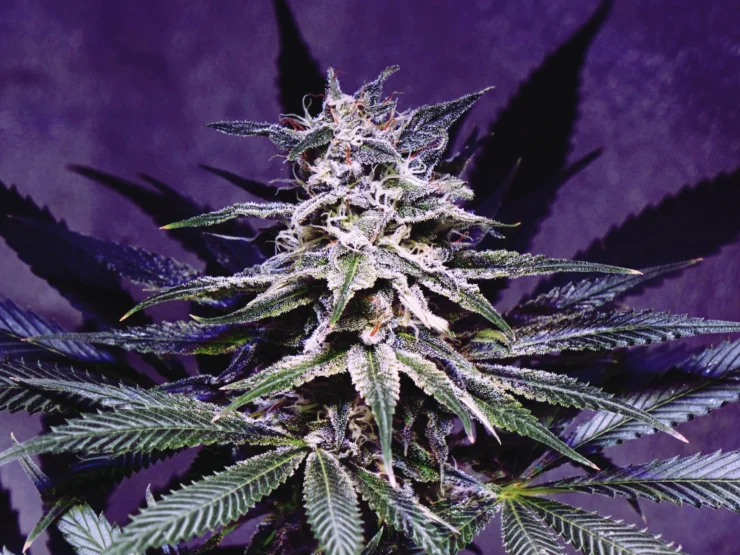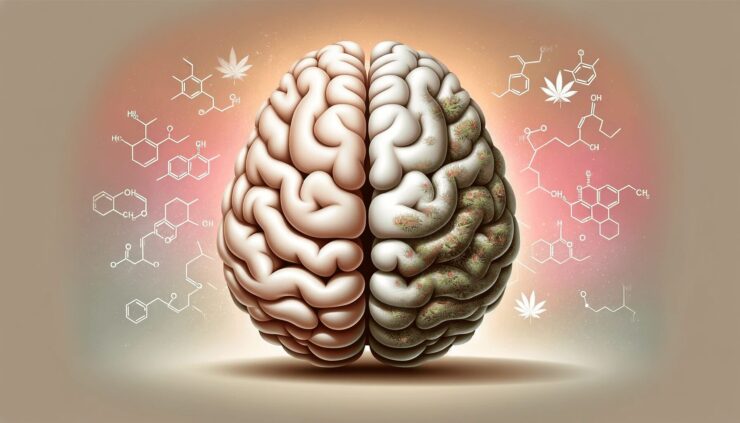Tetrahydrocannabinolic acid (THCA) is a non-psychoactive compound found in raw and live cannabis.
It plays a unique role in the world of cannabinoids, primarily due to its relationship with tetrahydrocannabinol (THC), the compound known for its psychoactive effects.
THCA serves as a precursor to THC; however, its impact on the brain and cognitive functions significantly differs from that of THC. Understanding THCA involves not only examining its chemical properties and transformation but also exploring its interaction with the brain’s complex systems. This exploration is essential in grasping the broader implications of cannabis use and its potential therapeutic benefits.
Chemical Nature and Conversion to THC

In the realm of cannabis research, THCA holds a critical position due to its chemical structure and transformation process. Structurally, Tetrahydrocannabinolic acid closely resembles THC but with an additional carboxyl group.
This slight variation has profound implications. Under certain conditions, such as exposure to heat or prolonged storage, THCA undergoes a process known as decarboxylation. During this process, the carboxyl group is removed, effectively converting Tetrahydrocannabinolic acid into THC. This transformation is crucial for understanding the different effects of these compounds.
While THC is known for its psychoactive properties due to its affinity for binding to cannabinoid receptors in the brain, THCA does not exhibit these psychoactive effects. This distinction has sparked interest in the scientific community, leading to investigations into how THCA might interact with the brain differently than its more famous counterpart.
THCA’s Interaction with the Brain

Despite THCA’s non-psychoactive nature, its interaction with the brain is an area of growing research interest. Unlike THC, which strongly binds to CB1 receptors in the brain and induces psychoactivity, Tetrahydrocannabinolic acid, often referred to as “thca-flower,” has a unique way of engaging with the brain.
It does not bind well to these receptors, which explains its lack of psychoactive properties. However, this does not imply that THCA is inactive in the brain. Recent studies suggest that THCA may have its own unique set of effects on cognitive functions and brain health.
For instance, there is evidence to suggest that Tetrahydrocannabinolic acid may possess neuroprotective qualities, potentially offering benefits in conditions characterized by neurodegeneration.
Furthermore, its impact on inflammation and oxidative stress in the brain is also under investigation. These areas of research are crucial in understanding the potential therapeutic uses of Tetrahydrocannabinolic acid and its role in cognitive health.
THCA and Cognitive Function

The relationship between THCA and cognitive function is a complex and multifaceted area of study. Cognitive functions, encompassing processes like memory, attention, and problem-solving, are crucial for daily functioning and overall mental health. While the psychoactive effects of THC have been known to impact these cognitive domains, the role of THCA is less clear.
Preliminary research indicates that THCA might influence cognitive functions, but not in the way THC does. Instead of the direct psychoactive effects seen with THC, Tetrahydrocannabinolic acid might exert its influence through indirect pathways.
For instance, its potential anti-inflammatory properties could play a role in maintaining cognitive health, particularly in conditions like Alzheimer’s disease where inflammation is a key factor. Additionally, the antioxidant properties of THCA may offer protection against oxidative stress, which can negatively impact cognitive functions.
Potential Therapeutic Benefits
The exploration of THCA’s potential therapeutic benefits is a burgeoning field. Unlike THC, which is often associated with recreational use and its psychoactive effects, Tetrahydrocannabinolic acid presents a different profile, possibly suited for therapeutic applications without the psychoactive side effects. Its potential neuroprotective properties could be valuable in treating neurodegenerative diseases.
Moreover, the anti-inflammatory and antioxidant aspects of Tetrahydrocannabinolic acid could be beneficial in a range of conditions where these factors play a role, including certain mental health disorders.
However, it is important to note that this area of research is still in its infancy, and much of the understanding of THCA’s therapeutic potential is based on preclinical studies. Rigorous clinical trials are necessary to fully understand the extent and mechanisms of THCA’s potential benefits.
Future Directions in Research

The future of THCA research holds exciting possibilities. As our understanding of this compound grows, so does the potential for discovering new therapeutic applications. One of the key areas of future research involves understanding the precise mechanisms by which Tetrahydrocannabinolic acid affects the brain and cognitive functions.
This includes investigating its interactions with different neurotransmitter systems and its impact on brain physiology. Additionally, the role of THCA in mental health, particularly in relation to cognitive functions and mood regulation, is an area ripe for exploration.
The development of targeted therapies that leverage the unique properties of Tetrahydrocannabinolic acid could revolutionize the way certain neurological and mental health conditions are treated. However, this future hinges on continued research, increased understanding, and a nuanced approach to the complexities of cannabis and its components.
Challenges in THCA Research

Despite the promising avenues in THCA research, there are significant challenges that must be addressed. One of the primary challenges is the legal and regulatory landscape surrounding cannabis and its derivatives. This often restricts the scope and scale of research, limiting access to high-quality materials for study.
Additionally, the complexity of cannabis as a plant with numerous compounds makes it challenging to isolate the effects of Tetrahydrocannabinolic acid . There is also the issue of variability in cannabis strains and the concentration of THCA, which can impact the consistency of research findings.
Furthermore, the transition from preclinical to clinical research presents its own set of hurdles, including the need for large-scale human trials to validate the findings from laboratory and animal studies. Addressing these challenges is crucial for advancing our understanding of THCA and harnessing its potential benefits.
Summary
In summary, THCA stands as a compound of significant interest in the realm of neuroscience and cognitive health. Distinct from its more famous counterpart, THC, Tetrahydrocannabinolic acid offers a non-psychoactive profile with potential neuroprotective, anti-inflammatory, and antioxidant properties.
While current research points towards a promising future, particularly in therapeutic applications, the path ahead is fraught with challenges. Legal, regulatory, and methodological hurdles must be overcome to fully unravel the mysteries of Tetrahydrocannabinolic acid and its impact on the brain.
As research continues to unfold, THCA could emerge as a key player in the treatment of cognitive and neurological conditions, offering a new horizon in the medical use of cannabis derivatives.

